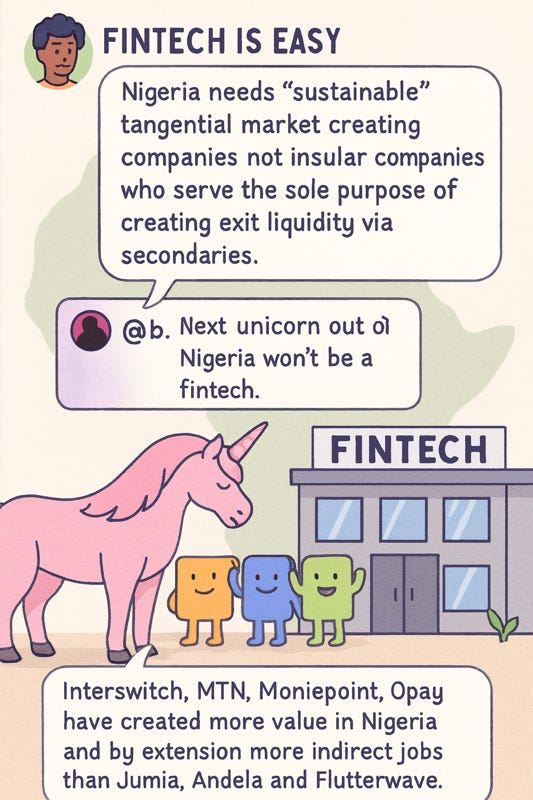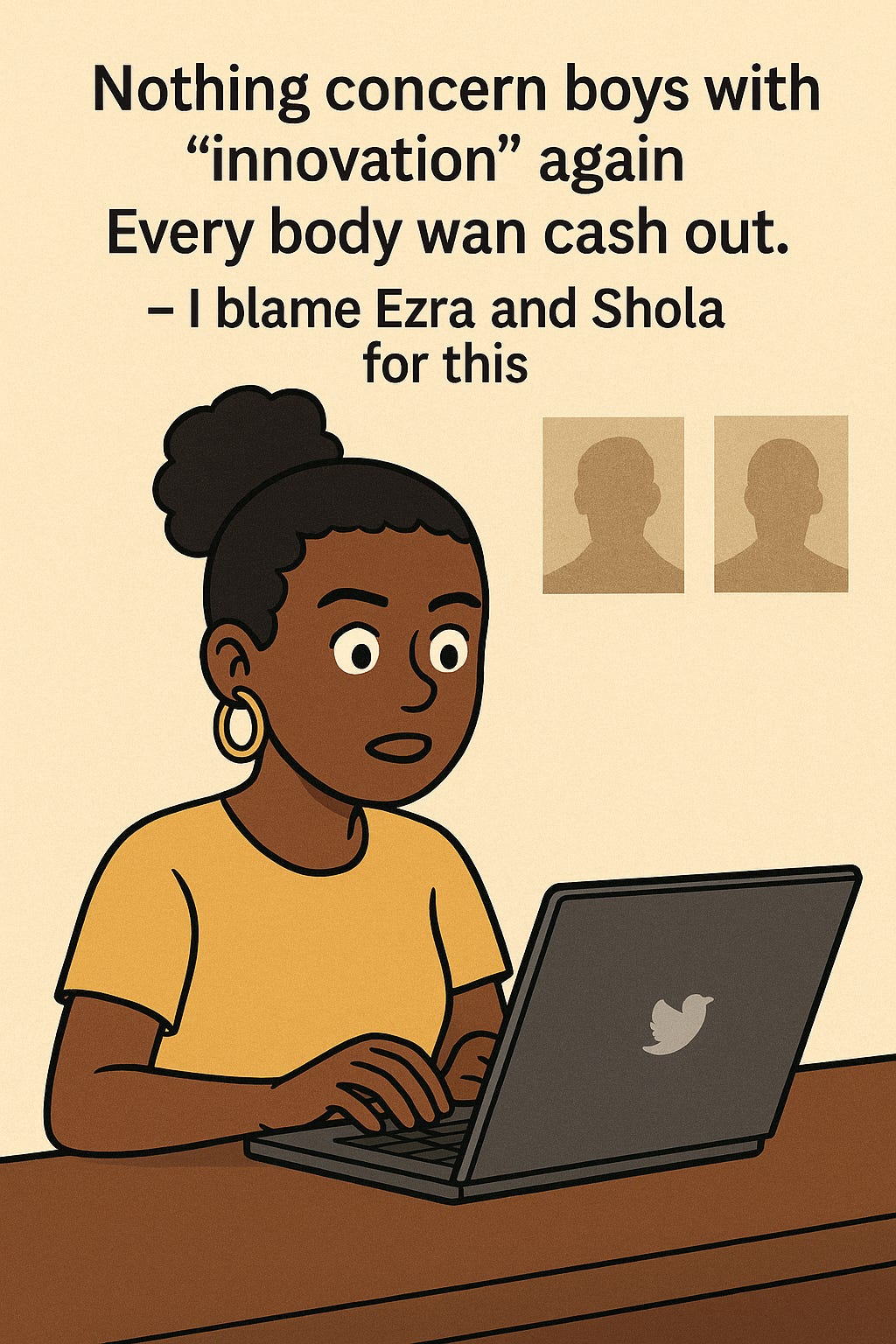Will the VC Thesis On Nigeria Actually Change?
Nigeria's next unicorns won't be a standalone giant that alters the landscape
If you missed Friday’s Notadeepdive, catch up here. If this email was forwarded to you, subscribe for free:
Also, inflation is one of my favorite topics, so be sure to read Credit Direct’s report on Nigeria’s July inflation figures.
TOGETHER WITH CREDIT DIRECT
Behind every percentage is a reality shaping your wallet and your decisions. The July Inflation Report helps you see the full picture, so you’re not just reading the news but understanding what it means for you.
When and how does the investment thesis on Nigeria and Africa change?
Congratulations to Honeycoin for closing its $4.9 million round to scale stablecoin-based cross-border payments in Africa
Big congrats to Cleva on two years of providing multi-currency accounts to over 500K customers
And shout out to Nomba for officially entering this multi-currency cross-border segment with the LinkedIn announcement - (Where is the fanfare and PR spin?).
At least you all know the direction this is going.
This post can be read as part 2 of the first post on VC dynamics and thinking written here.
"If you are a young founder, ride on waves. You are not Elon Musk or Sam Altman. The waves today are AI and Stablecoins, so ride that wave. The only exception here is if you are in a knee-deep relationship with your customers, that is the only place the investors have projected growth, so go for that growth, and don't waste your time on anything else"
That quote comes from Opeyemi Awoyemi, a two-time exited founder of Jobberman and Go54 (formerly Whogohost), speaking at the Afridigest session on the art and science of selling a startup in Africa.
A few weeks ago, as part of the online commentary surrounding the Chowdeck raise, a tweet asked where the next unicorn from Nigeria would come from. Spoiler alert: it's going to be Moove.
I've previously argued that the American VC-funded model of company creation – while yielding significant wins – isn't the best approach for Nigerian businesses. Nigerian companies serve numerous stakeholders in a country desperately needing market-creating innovation to lift citizens out of mass unemployment.
Palm oil, cocoa, oil, GSM, banking and financial services, power, manufacturing, trading conglomerates, imports, and now tech – these industries have driven GDP growth and unemployment reduction over Nigeria's 60+ year existence, attracting significant investment and job creation.
However, Nigeria's neo-technology ecosystem (VC-backed companies) tells a different story. Since 2005, the industry has attracted less than $10 billion in investments and created fewer than 30,000 direct jobs, despite housing companies with private valuations exceeding the entire NGX market capitalisation.
For comparison, Dangote Cement employs over 20,000 people directly and is valued at just over $5 billion.
Switch your VPN to Kenya or Nigeria, and you'll be bombarded with ads from companies selling multi-currency accounts, promising painless, cheap cross-border payments for freelancers and internet creators.
I have my worries about the viability of this market and whether the continent as a whole has enough "freelancers" and people legitimately needing multi-currency accounts to justify the number of companies being formed in this space. But like my VC friends tell me, it's the latest game in town, and valuations and returns must be pursued at all costs.
But when? And how? Does the VC thesis of the day change for the Nigerian and African market? What tangible results can we demonstrate in real impact, rather than just valuations and exits? How do we create unicorns and one million-plus jobs simultaneously?
VC Funded trends in Nigeria, a condensed breakdown.
Pre-2010, most internet-enabled successes came from MTN, Interswitch, banks, or bootstrapped and PE-funded entities. CWG, Chams, and eTranzact, to name a few, are some of the surviving OGs who trailblazed with different playbooks, setting the scene for today's VC-backed media darlings.
The Early days: E-commerce, Marketplaces and Infrastructure
The 2010s were supposed to be Nigeria's e-commerce decade. Marketplaces of all kinds were the toast of the day: Jumia raised hundreds of millions, positioning itself as the Amazon of Africa. Konga burned through cash trying to keep up.
The narrative was clear: Nigeria has 200 million people, mobile phones are everywhere, card payment and pay on delivery models were on the rise. Build it, and they will come. Adjacent businesses like Jobberman, Hotelsng, and Iroko TV all grabbed the spotlight here.
As long as Nigerians were getting on the internet, you could pitch Tiger, Kinnevik, Naspers or Rocket to build a marketplace-type business.
Jumia ended up getting its IPO, Konga was sold for a disrespectful sum, Iroko engineered an exit via its ROK studios vertical, Jobberman secured a quiet exit, OLX and various other marketplaces either shut down or disappeared.
Jason Njoku spent the better part of a decade giving honest accounts from the trenches, but this blog post is a perfect summary of that era.
Flutterwave and Paystack ate Interswitch's lunch by building cheaper, easier-to-deploy payment rails that multiplied e-commerce possibilities. While marketplaces burned money competing on concessions, logistics, and inventory, the gateways solved the fundamental problem of collecting money from Nigerian customers online.
And then there was Andela. They raised $381 million to turn Nigeria into a global tech outsourcing hub, made beautiful presentations about African talent, then downsized Nigerian operations to focus on "more predictable markets."
The decade may have started with Tiger, Kinnevick, Naspers, ROAM, and Rocket, but Ventures Platform, Leadpath, LoftyInc, Ingressive Capital, and EchoVC were stepping into the arena with their own thesis and definition of the market they wanted to fund.
Transportation and Logistics
Ride-sharing keeps returning in waves, ending with the same outcome. The thesis: copy Uber's model, adapt it for Nigerian roads, wait for network effects.
EasyTaxi (backed by Rocket) and TranzitNG joined Taxify (now Bolt) in burning cash on incentives to dethrone Uber. Cars45 pivoted multiple times. Lori Systems and Kobo360 made expensive mistakes that GIGM, Redstar, and DHL avoided. Lagos killed Gokada and Max with policy, then launched LagRide.
Only one player truly survived this wave: Opay. But they didn't win by being the best ride-hailing app. They won by going vertical. Payments, logistics, ride-hailing, food delivery - they built a super-app ecosystem where each product fed the others. While everyone else was trying to make the economics of logistics and transportation work, Opay tried to become the everything-app of Nigeria. Awash with lots of capital, they eventually shaped the market into an outcome their backers willed into existence and got it right.
The lesson, though, was clear: in a market where customer acquisition costs are high and loyalty is low, you need multiple revenue streams from the same user base. Single-feature products are luxury plays for mature markets.
Unbundling of Banking Services
This has been my favourite play to witness. “Banks are shit”, “banks don't bank”, “they don't lend”, “they don't allow you to save”, “they don't know how to invest”, etc, etc.
Every Nigerian big boy and big girl has complaints like these. Of course, they are unfounded, and we have proof.
The great unbundling allowed everyone to step into the arena and provide real value to customers by asking, “Why should banks get all the margin on deposits?” “Why can't we offer better interest rates and a beautiful user experience?” and my personal favourite, “Surely it must be easy to build a better bank than that chap at Akin Adesola”
Piggyvest and Cowrywise tackled Savings with target savings, mutual funds and recurring savings plans. Between them, they have raised a conservative $7 million, fending off clones and attempts by banks to rebuild what they have.
Carbon, Migo and Fairmoney offered instant loans, taking up LAPO’s offerings up a notch, and making the banks finally innovate with Quick Credit and its clones.
I have seen memes about PalmPay’s agents and their tactics for getting serial loan defaulters to pay. TikTok is also awash with strategies on how to manipulate various payday lenders and get away with not repaying the loans.
Then came the investment and insurance platforms. Risevest, Bamboo, WellaHealth, have done their best to go toe to toe with Mansard, Stanbic and Leadway. Reliance, Trove, and Chaka put up good fights in this category.
The products were genuinely better than what traditional banks offered, and they educated an entire generation of young Nigerians about financial planning.
One could argue that they educated the market without fundamentally transforming it. The banks did not copy them, yet the banks are still growing in these categories as they have become supplementary products for the already financially literate middle class, not replacement infrastructure for the masses.
These products have ended up delivering a strong cultural impact, as they proved Nigerian consumers would trust fintech apps with their money, setting the stage for everything that came after.
Bank 2.0
Unbundling a bank’s customer-facing products is sexy. Unbundling core banking infrastructure is hard.
The next wave was about banking infrastructure and neobanks. We had failed to replicate M-Pesa in the country, so maybe we could build our own NuBank, Tinkoff, Wise, Revolut and Square.
Free transfers, free cards, card delivery, business banking, banking as a service, agency banking, POS machines, and bots for transfers. The bet was that if you could make moving money cheaper and easier, everything else would follow.
Kuda promised to be "the bank of the free." Nomba (formerly Kudi) gave everyone a POS following the agency banking route of Paga and First Monie.
Despite all these efforts and circulars pushing financial inclusion, Moniepoint and Opay emerged as clear winners here by pivoting into the agency banking vertical from their banking-as-a-service and super app businesses.
They focused obsessively on agent networks and cash-heavy markets during a botched currency crisis rather than forcing digital-first solutions on cash-preferring customers.
Moniepoint understood that Nigerian businesses don't want fancy dashboards or yet another app; they want reliable ways to collect and confirm that the payment was successful.
Opay understood that the path to digital payments ran through satisfied human customers who would become agents, such as your Uber driver, and my local barman, who finally started accepting digital money after years of me trying to pay with a transfer.
One won on the retail side, the other won on the merchant side; now they both want to own all sides of the equation.
The Great Virtual Card and Business Banking Experiments: Much Ado About Nothing
And then we had the duds. Virtual cards were supposed to unlock global commerce for Nigerians in the midst of an FX crisis. Chipper Cash raised $250 million to enable cross-border payments. Klasha, Union54, Payday - they all chased the same dream of becoming the bridge between Nigerian consumers and global e-commerce.
The problem wasn't technical. The cards worked, the apps were beautifully designed, and the influencer-led marketing was on point.
The promoters, however, grossly underestimated the market size, the cost of operating these businesses, and the fraud vectors that plague card issuing. How many Nigerians actually needed to make regular international online purchases? How many had enough disposable income to make this a sustainable business model?
Turns out, not enough. The addressable market was smaller than the fundraising decks suggested, and customer acquisition costs were higher than the unit economics could support.
Business banking, on the other hand, was built on the premise that corporate internet banking platforms are ugly and inefficient. Surely there must be an easier-to-use and sexier product in the market than the ugly corporate platforms the banks were selling to businesses.
Float, Glade, Brass, Prospa, OurPass, etc, have all been in the news for various reasons, proving business banking isn't easy despite founder assumptions. They convinced themselves their target customers were online digital native businesses, who lacked steady cash flow to make this worthwhile.
Honourable mention: Gambling
From Baba Ijebu to Bet9ja, to Sportybet and a host of others, gambling just works in this market. You just need to deploy lots of capital, invest in mobile, and remember to use agents in your distribution model.
Funny how it seems we can learn about the role of “agents” in Nigeria from MTN, Indomie, Moniepoint, religion, and gambling businesses.
The Current State: Building for Acquisition, Not Revolution
It wasn't that long ago that the gospel was disruption. The mission was to unbundle the clumsy, complacent old banks. Now, it feels different, as the differentiating mission for companies of today is hard to identify.
Each wave taught lessons: E-commerce showed that scale is hard. Transportation asked us to learn vertical integration. Saving and investment platforms created smarter consumers, not giant companies. Free transfers taught us distribution and aggressive marketing. Business banking and virtual cards reminded us of the age-old quote, "There's a gap in the market, but is there a market in the gap?
The problem with mapping this shift is that these startups are no longer building audacious replacements; they're building complements and plugging the holes in an evolving financial system where, one way or another, all roads lead back to Segun Agbaje or Mitchell Elegbe, and more recently, Tosin Eniolorunda, Olugbenga Agboola and Shola Akinlade.
Employees and customers need to be wary of the disrupting the world kool aid they drink from founders, because we are not all playing the same games, or optimising for the same outcomes.
Since this fintech wave kicked off around 2016, the entire industry has raised less than $10 billion and created maybe 10,000 direct jobs, with one company doing most heavy lifting. (NuBank employs over 11,000 people for context.)
We have successfully financialised our industry, sacrificing jobs and disruption for the benefit of privileged insiders. Isn't that the same lesson from Femi Otedola's book? The evergreen Nigerian playbook: creating incredible wealth for a new class of oligarchs without solving mass unemployment.
So, Who Actually Wins Here?
We were supposed to build for the next billion and kill the banks from here. It was fun to observe, but VCs are no longer writing massive checks for the grand, audacious vision of becoming the next GTBank. That bet has gotten too expensive and too difficult, especially with regulators like the CBN demonstrating how quickly they can change the rules of the game with a single circular.
Instead, the thesis has pivoted to sustainability and engineering a profitable exit. Build hyper-efficient, single-feature products solving particular pain points legacy companies are too lazy to fix. Build the best multi-currency wallet, stock trading app, crypto app, late-night grocery delivery feature, inventory management system, or microsite for Lagos food vendors.
Do it well, get traction, and then wait for an offer from one of the big names you were originally supposed to disrupt. Worst case, they poach you or your team to lead product development in a new vertical. These startups are now functioning as outsourced R&D labs.
We've watched the thesis change from "X for Africa" to "public market scale" to "M&A." This is the new game. The next "unicorn" won't be a standalone giant, fundamentally altering the landscape. It'll be the team building a powerful feature that an incumbent desperately needs.
Which brings us back to that stark conclusion: In this climate, the surest path is building something VCs want to fund that they believe they can sell.
Will the thesis after this create the jobs and economic transformation the country desperately needs, or will it simply create more wealth for an increasingly small group of well-connected founders and investors?
Maybe it's time to admit that the American VC model, transplanted to Nigerian soil, skips industry and market creation outcomes, landing only on generating returns for investors, modest job creation, and solutions primarily serving people who were already well-served.
Until then, please download my stablecoin app.
Co-written with help from Tolu G, Binjo A, Busolami K, and Inkriv
Related Links









“Lapo’s offerings” 😭
Reminded me of the tweet from openafricapod that says -
There might not be enough freelancers to prop up the usd account for freelancers market,but there’s enough crime and that’s enough.